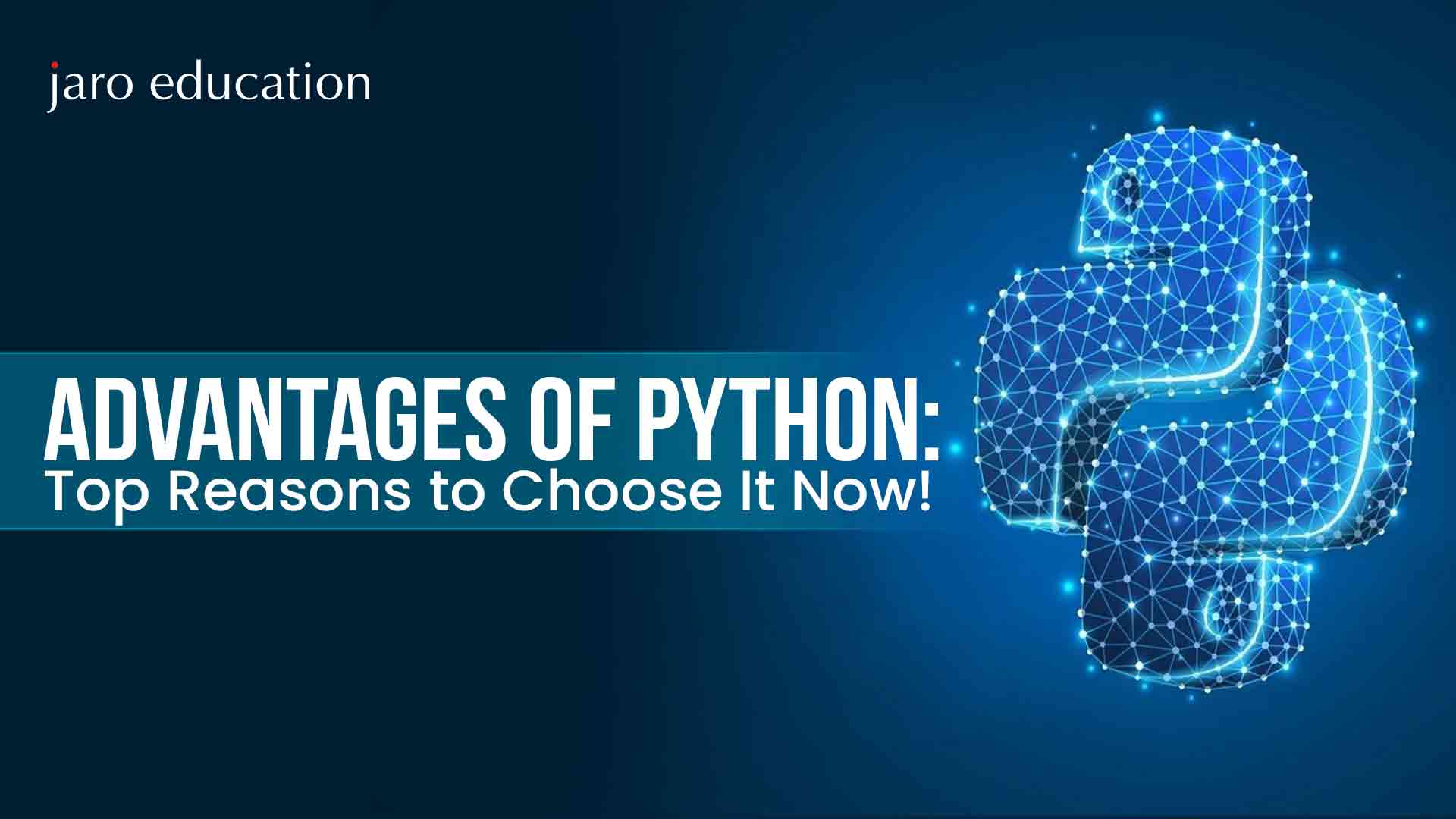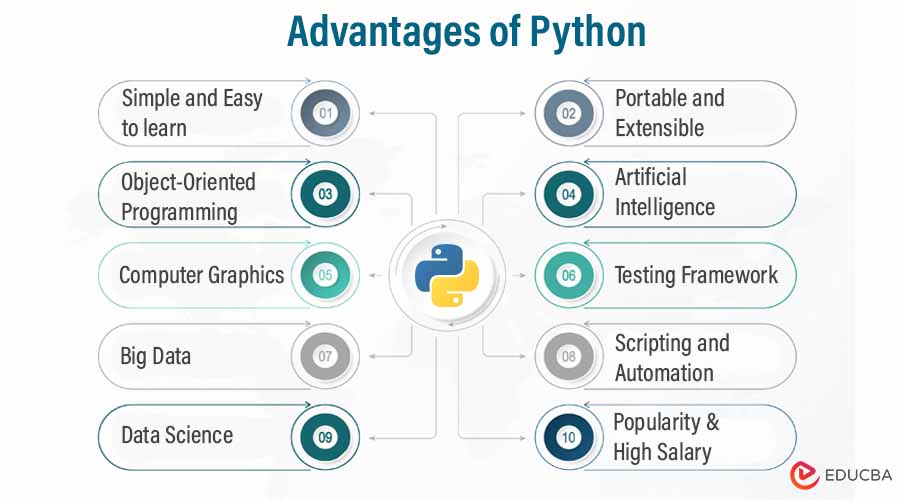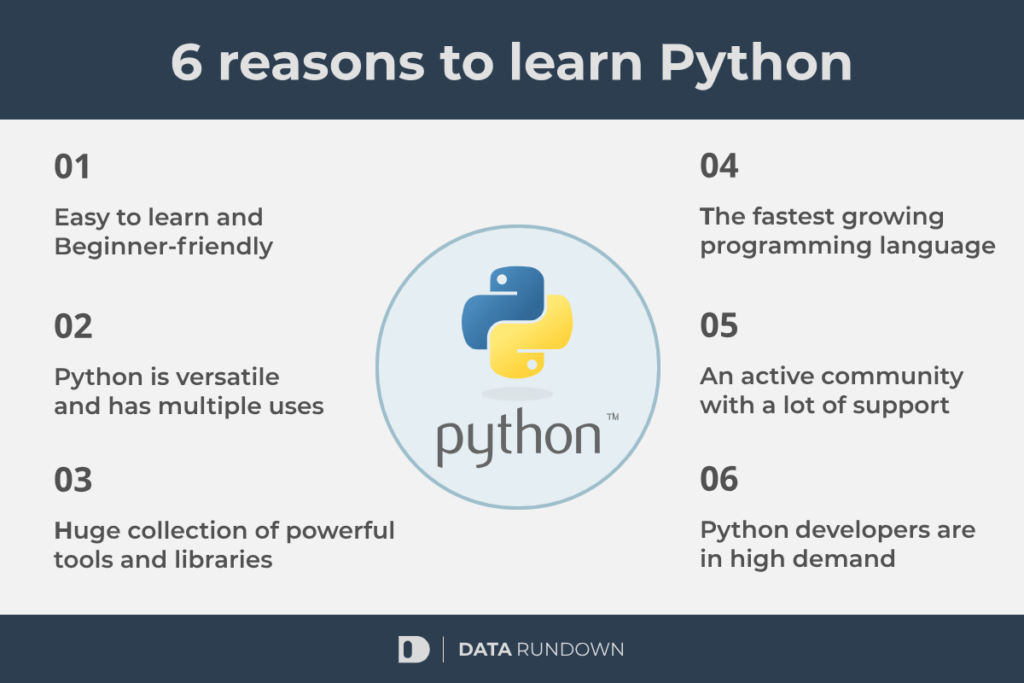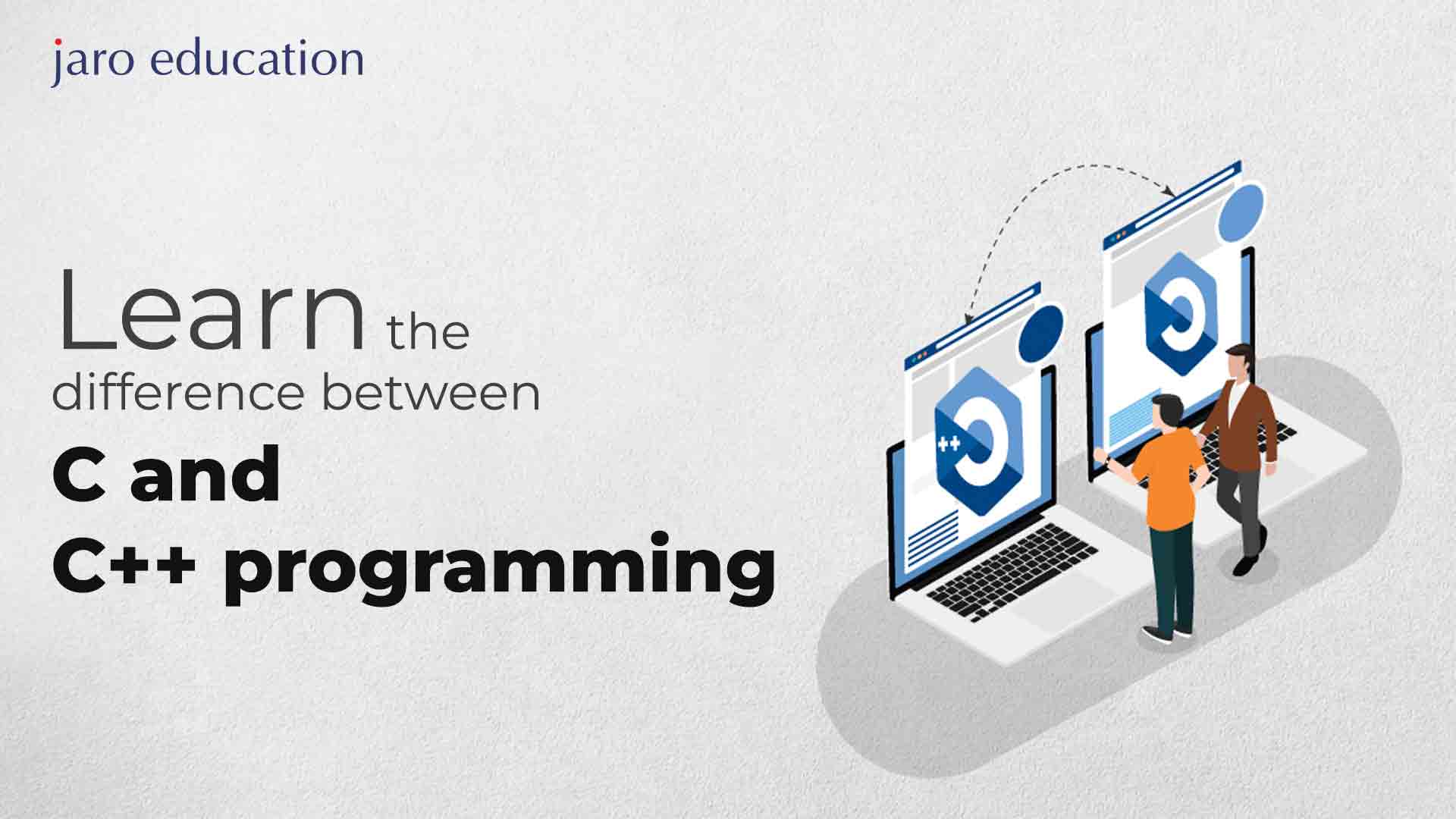Advantages of Python: Top Reasons to Choose It Now!
Table of Contents

- jaro education
- 14, July 2024
- 11:00 am
Python has become a real powerhouse language in the always evolving field of programming, attracting developers all over the globe with its powerful features, simplicity, and adaptability. There are several advantages of Python over other programming languages. The need for qualified developers fluent in Python is still rising as companies and organizations from many sectors come to understand its benefits. Now is the perfect moment to enter the dynamic world of Python programming and open up a world of fascinating opportunities.
In order to clarify why Python should be your first option for a variety of applications and projects, this blog attempts to reveal its main benefits. Python has a large array of modules and frameworks that allow developers to tackle a variety of jobs quickly. Its cross-platform interoperability provides flawless operation across multiple operating systems, while its exceptional flexibility enables a wide range of uses, including web development, data analysis, artificial intelligence, and more.
Examining the advantages of Python will help you to fully appreciate why developers all across the world have come to love this language. Prepare to take a step that may change your professional path and lead to fascinating prospects in the constantly expanding field of Python programming.
Top Advantages of Python You Should Know About
There are several advantages of Python. Here is an elaborate account of the same.

educba.com*
Readability and Simplicity
There are many advantages of Python, including its remarkable readability and simplicity. Since Python’s grammar is modelled around the English language, even novice programmers may pick it up rather quickly. The simple and uncomplicated code structure frees engineers from struggling with intricate syntax rules and instead concentrating on finding solutions. Here are a few ways in which Python enhances readability:
Clear and Simple Syntax
Python’s syntax is designed to be readable so programmers can produce expressive and succinct code. Because Python is simple, code stays understandable even as projects become bigger, unlike many other programming languages that may get complicated and hard to maintain.
Fast Development and Prototyping
Python makes development and prototyping quick because of its simplicity. Developers’ ability to rapidly test and iterate concepts may accelerate time-to-market for goods and apps and streamline development.
Easily Learned Language
Python’s simplicity makes it a great option for novices starting their programming careers. Its easy learning curve and extensive documentation guarantee that novices may pick up ideas fast and confidently begin constructing projects.
Entire Libraries and Frameworks
The library and framework ecosystem of Python is one of its most convincing features; it allows developers to handle a variety of jobs effectively. Python’s vast toolkit significantly increases its capabilities in everything from machine learning and web development to data analysis and scientific computing. This adaptability is made feasible by:
Enriched Library
Python has a large standard library with many modules and tools for everyday programming chores. This library saves developers from having to create the wheel in fields like file management, networking, data processing, and more.
Potent Independent Libraries
Python uses an enormous array of third-party libraries supplied by its active community in addition to the standard library. The following libraries have transformed data analysis, scientific computing, machine learning, and web development: NumPy, Pandas, Matplotlib, TensorFlow, and Django.
Flexibility Throughout Domains
Python is a flexible language with many applications because of its large libraries and frameworks. Whether it is work in data science, web development, automation, or scientific computing, Python provides the resources and tools you need.
Cross-Platform Compatibility
Cross-platform compatibility has become one of the critical advantages of learning Python in today’s varied technological environment, as software and applications must work across many platforms and operating systems. In this sense, Python lets programmers write once and execute it smoothly on Windows, macOS, and Linux. Because of this cross-platform compatibility, developers may now build software solutions that can be utilised and deployed on many platforms without requiring significant changes or platform-specific modifications.
Independent of Platforms Code
Python’s cross-platform compatibility implies that developers don’t require separate codebases or platform-specific tweaks to produce apps and scripts that function reliably across several platforms.
Developed and Deployed Easily
By creating code that runs well across many platforms, developers can speed up their development and deployment procedures and save time and money.
Networking and Mobility
Cross-platform interoperability promotes collaboration among developers using different operating systems. It enables easy sharing and integration of code, ensuring smooth teamwork and project portability.
Automation and Scripting
Cross-platform interoperability promotes collaboration among developers using different operating systems. It enables easy sharing and integration of code, ensuring smooth teamwork and project portability.
System Administration and DevOps
Python is perfect for DevOps and system administration jobs because of its simplicity and cross-platform interoperability. Python’s scripting features simplify processes and save labour, from managing databases and network setups to automating server installations and monitoring.
Extracting Data from the Web
Python becomes a potent tool for web scraping and data extraction with packages like Beautiful Soup and Scrapy installed. Developers may collect and analyze data more quickly and effectively via websites, APIs, and other internet sources.
Task Automation and Scripting
Because Python is so flexible, it can automate everything from file management and data processing to GUI automation and report creation. Because of its scripting features, developers may automate repetitive and monotonous jobs, saving time for more worthwhile projects.
Powering Insights: Data Analysis and Scientific Computing
The advantages of Python extend to its strong libraries and potent data manipulation capabilities, which have made it a dominating force in the fields of scientific computing and data analysis. These functions become possible through the following means.
The Fundamental Data Analysis Libraries, NumPy and Pandas
NumPy and Pandas are two of the most often used Python data analysis packages. Whereas Pandas gives strong data manipulation and analysis capabilities for structured data, NumPy delivers effective numerical calculations and array operations.
Easy Data Visualisation with Matplotlib and Seaborn
Libraries like Matplotlib and Seaborn, which enhance NumPy and Pandas, allow developers to produce beautiful data visualizations ranging from basic line plots to intricate interactive charts and graphs. This simplifies the communication of patterns and insights within data.
Deep Learning and Machine Learning Publications
Python is unquestionably a major player in machine learning and deep learning. Develop and deploy complex models for jobs like image recognition, natural language processing, and predictive analytics using libraries like TensorFlow, PyTorch, and Scikit-learn.
Computer Science and Research
Python’s flexibility also reaches scientific computing and research; libraries like SciPy, SymPy, and BioPython serve fields like biology, physics, mathematics, and more. Python may be used by scientists and researchers to model, analyze, and propel scientific findings.
Scalable and Quick Web Development
The advantages of Python clearly extrapolate to optimal web development, even if it may not be the first language that comes to mind. This language provides a dependable and expandable platform for creating web applications of various sizes using frameworks like Django, Flask, and Pyramid. Such is made feasible by:
Django: A Complete Framework
Django is an architectural pattern-following high-level Python web framework. With so many tools and frameworks available for jobs like authentication, URL routing, and database integration, creating sophisticated, database-driven online apps is easier.
Lightweight and flexible Flask
The lightweight and adaptable Python web framework Flask upholds the ideas of simplicity and minimalism. Small to medium-sized web applications benefit greatly from its ease of use and great control and flexibility.
Scalable and modular Pyramid
Scalability and modularity were considered while creating the Pyramid Python web framework. It is built on the Model-View-Controller (MVC) paradigm and gives developers a strong toolkit for creating enterprise-class, large-scale online applications.
Complementary Front-End Technologies
Python’s web frameworks let developers create contemporary, interactive, and responsive online apps that provide outstanding user experiences by integrating easily with well-known front-end technologies like JavaScript, React, and Angular.
Local Resources and Support
Among Python’s best features is its active and encouraging community. Python benefits from many tools, documentation, and cooperative problem-solving since millions of developers have contributed to its development and progress. Sources of this power include:
Proactive Open-Source and Community Contributions
Because it is open-source, Python attracts a lively developer community that actively advances the language. The cooperative attitude of the Python community guarantees innovation and ongoing progress in everything from bug patches and new features to documentation and tutorials.
Entire Record and Instructional Materials
With official manuals, tutorials, and reference resources, Python has a wealth of documentation. It is also now simpler than ever to learn and master Python programming because to the community’s creation of many online resources, including blogs, forums, and video classes.
Meetings & Conferences
Because of the advantages of Python, it is so popular that it has a worldwide network of conferences, meetings, and user organisations, and provides opportunities for networking, information sharing, and community-building among Python aficionados.
Career Opportunities and Jobs
As more sectors come to understand the advantages of learning Python programming, there is a growing need for certified Python developers. Making Python your programming language of choice might open up a range of career and professional prospects. These clearly show this.
Programming Python Jobs
According to current labour market statistics, python programming jobs are needed in a number of industries, including technology, banking, healthcare, and scientific research. Employers realising the advantages.
Top Pay Grades and Positions
Beyond just being able to get work, the advantages of learning Python give one the opportunity to choose very lucrative professional pathways. Current pay statistics indicate that Python programmers can anticipate competitive pay; seasoned pros may make well into six figures a year.
Large Industries
Python is a language so flexible that employment options are not industry-specific. Python programmers are in great demand in many industries, including financial institutions, healthcare institutions, research organisations, IT giants and startups.

The Bright Future of Python
Python’s popularity makes it a language prepared for future development and innovation, given the quick progress of technology. Scalability, agility, and strong community support keep it in front of new technologies and trends.
Artificial intelligence, machine learning
Python is already somewhat well-known in the domains of machine learning and artificial intelligence, and these technologies will only increase in prominence. PyTorch and TensorFlow libraries are dynamic. Hence, Python will always be a major force behind developments in these fields.
Statistic and Mathematics
The exponential expansion of data nowadays makes powerful data analysis tools and methods very crucial. NumPy, Pandas, and Matplotlib are among the Python data analysis tools that make handling huge datasets and intelligent data extraction simpler.
Systems embedded with the Internet of Things
Two other domains in which Python is very versatile are embedded devices and the Internet of Things (IoT). Python, a lightweight and cross-platform language, makes it easy to create software for Internet of Things gadgets, smart home appliances, and other embedded systems. Research and Science of Computers
Python will continue being vital in promoting scientific discoveries and knowledge because of its huge libraries, notably SciPy and NumPy, and its strong position in scientific computing and research domains.
Final Thoughts on Advantages of Python
Python is a real powerhouse in the always-changing field of programming languages, providing a wide range of benefits that make it an outstanding option for professionals in many different fields. With its readability and simplicity, large libraries and frameworks, cross-platform interoperability, and automation features, the advantages of Python enable developers to take on various jobs effectively. Whether you’re an experienced programmer or just getting started, learning Python may lead to a world of possibilities. It is an investment that will provide benefits for many years because of its active community, extensive resources, and rising demand in the labour market.
If you want to learn Python and other computational languages from industry experts, the MSC (Data Science) course at Symbiosis School For Online And Digital Learning can be an ideal choice. This programme provides thorough information on Python, machine learning, data visualisation, and more, all intended to give you the abilities you need to succeed in a data-driven society. Gain practical experience via actual projects and study from industry professionals. Make a career investment in data science now with this esteemed online degree.












